- Clone
- N382/14 (See other available formats)
- Regulatory Status
- RUO
- Other Names
- Mitochondrial Fission Factor, C2orf33, Chromosome 2 Open Reading Frame 33, EMPF2, GL004
- Isotype
- Mouse IgG1, κ
- Ave. Rating
- Submit a Review
- Product Citations
- publications
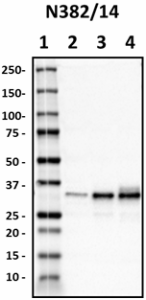
-

Western blot of purified anti-MFF antibody (clone N382/14). Lane 1: Molecular weight marker; Lane 2: 20 µg of human brain lysate; Lane 3: 20 µg of mouse brain lysate; Lane 4: 20 µg of rat brain lysate. The blot was incubated with 1.0 µg/mL of the primary antibody overnight at 4°C, followed by incubation with HRP-labeled goat anti-mouse IgG (Cat. No. 405306). Enhanced chemiluminescence (Cat. No. 426302) was used as the detection system. -

IHC staining of purified anti-MFF antibody (clone N382/14) on formalin-fixed paraffin-embedded mouse brain tissue. Following antigen retrieval using Sodium Citrate H.I.E.R (Cat. No. 928502), the tissue was incubated with 2.0 µg/ml of the primary antibody overnight at 4°C. BioLegend’s Ultra Streptavidin (USA) HRP Detection Kit (Multi-Species, DAB, Cat. No. 929901) was used for detection followed by hematoxylin counterstaining, according to the protocol provided. The image was captured with a 40X objective. Scale Bar: 50 µm -

IHC staining of purified anti-MFF antibody (clone N382/14) on formalin-fixed paraffin-embedded mouse testicle tissue. Following antigen retrieval using Sodium Citrate H.I.E.R (Cat. No. 928502), the tissue was incubated with 2.0 µg/ml of the primary antibody overnight at 4°C. BioLegend’s Ultra Streptavidin (USA) HRP Detection Kit (Multi-Species, DAB, Cat. No. 929901) was used for detection followed by hematoxylin counterstaining, according to the protocol provided. The image was captured with a 40X objective. Scale Bar: 50 µm -

IHC staining of purified anti-MFF antibody (clone N382/14) on formalin-fixed paraffin-embedded rat brain tissue. Following antigen retrieval using Sodium Citrate H.I.E.R (Cat. No. 928502), the tissue was incubated with 2.0 µg/ml of the primary antibody overnight at 4°C. BioLegend’s Ultra Streptavidin (USA) HRP Detection Kit (Multi-Species, DAB, Cat. No. 929901) was used for detection followed by hematoxylin counterstaining, according to the protocol provided. The image was captured with a 40X objective. Scale Bar: 50 µm -

IHC staining of purified anti-MFF antibody (clone N382/14) on formalin-fixed paraffin-embedded rat testicle tissue. Following antigen retrieval using Sodium Citrate H.I.E.R (Cat. No. 928502), the tissue was incubated with 2.0 µg/ml of the primary antibody overnight at 4°C. BioLegend’s Ultra Streptavidin (USA) HRP Detection Kit (Multi-Species, DAB, Cat. No. 929901) was used for detection followed by hematoxylin counterstaining, according to the protocol provided. The image was captured with a 40X objective. Scale Bar: 50 µm
| Cat # | Size | Price | Quantity Check Availability | Save | ||
|---|---|---|---|---|---|---|
| 857501 | 25 µg | £57 | ||||
| 857502 | 100 µg | £113 | ||||
Mitochondrial fission factor (MFF) is a mitochondrion outer membrane protein that is part of the mitochondrial fission complex where it acts a receptor for the dynamin-related protein 1 (Drp1). The MFF-Drp1 complex is responsible for the promotion of mitochondrial fission. MFF has also been shown to regulate peroxisome morphology.
Product DetailsProduct Details
- Verified Reactivity
- Human, Mouse, Rat
- Antibody Type
- Monoclonal
- Host Species
- Mouse
- Immunogen
- Fusion protein including amino acids 1-173 and 272-322 of human MFF
- Formulation
- Phosphate-buffered solution, pH 7.2, containing 0.09% sodium azide.
- Preparation
- The antibody was purified by affinity chromatography.
- Concentration
- 0.5 mg/ml
- Storage & Handling
- The antibody solution should be stored undiluted between 2°C and 8°C.
- Application
-
WB - Quality tested
IHC-P - Verified - Recommended Usage
-
Each lot of this antibody is quality control tested by Western blotting. For Western blotting, the suggested use of this reagent is 0.5 - 5.0 µg per ml. For immunohistochemistry on formalin-fixed paraffin-embedded tissue sections, a concentration range of 0.5 - 10 µg/ml is suggested. It is recommended that the reagent be titrated for optimal performance for each application.
- Product Citations
-
- RRID
-
AB_2783475 (BioLegend Cat. No. 857501)
AB_2783475 (BioLegend Cat. No. 857502)
Antigen Details
- Structure
- MFF is a 342 amino acid protein with a molecular mass of ~38 kD.
- Distribution
-
Tissue Distribution: Highly expressed in heart, kidney, liver, brain, muscle, and stomach.
Cellular Distribution: Mitochondria, peroxisome, nucleus, and cytosol. - Function
- MFF plays a role in mitochondrial and peroxisomal fission by facilitating the recruitment and association of the fission mediator dynamin-related protein 1 (DNM1L) to the mitochondrial surface.
- Interaction
- MFF interacts with the dynamin-related protein 1 (Drp1). MFF has also been shown to interact with DDX28 and ILF3.
- Biology Area
- Cell Biology, Mitochondrial Function, Neuroinflammation, Neuroscience
- Molecular Family
- Organelle Markers
- Antigen References
-
- Moon Yong Cha, et al. 2018. PLoS Curr. 26;10.
- Kornfeld OS, et al. 2018. Sci Rep. 19;8(1):14034.
- Otera H, et al. 2010. J Cell Biol. 13;191(6):1141-58.
- Liu R, et al. 2015. Mol Biol Cell. 1;26(24):4466-77.
- Gene ID
- 56947 View all products for this Gene ID
- UniProt
- View information about MFF on UniProt.org
Related Pages & Pathways
Pages
Related FAQs
Other Formats
View All MFF Reagents Request Custom Conjugation| Description | Clone | Applications |
|---|---|---|
| Purified anti-MFF | N382/14 | WB,IHC-P |
| Biotin anti-MFF | N382/14 | ICC |
Compare Data Across All Formats
This data display is provided for general comparisons between formats.
Your actual data may vary due to variations in samples, target cells, instruments and their settings, staining conditions, and other factors.
If you need assistance with selecting the best format contact our expert technical support team.
-
Purified anti-MFF
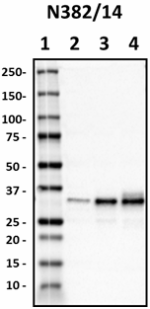
Western blot of purified anti-MFF antibody (clone N382/14). ... 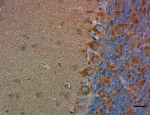
IHC staining of purified anti-MFF antibody (clone N382/14) o... 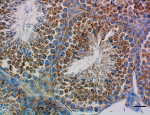
IHC staining of purified anti-MFF antibody (clone N382/14) o... 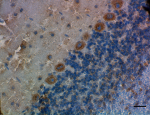
IHC staining of purified anti-MFF antibody (clone N382/14) o... 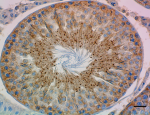
IHC staining of purified anti-MFF antibody (clone N382/14) o... -
Biotin anti-MFF
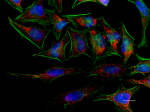
ICC staining of Biotin anti-MFF antibody (clone N328/14) on ... 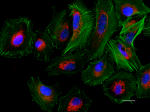
ICC staining of Biotin anti-MFF antibody (clone N328/14) on ...
 Login / Register
Login / Register 







Follow Us